
- Détails
- Écrit par David Sicé


Island At The Top Of The World (1974)
Traduction du titre original : L'île au sommet du monde.
Sorti en Angleterre le 16 décembre 1974.
Sorti aux USA le 20 décembre 1974.
Sorti en France le 29 octobre 1975.
Sorti en DVD français le 10 mars 2004.
De Robert Stevenson, sur un scénario de John Whedon (le grand-père de Joss Whedon) d'après le roman de Ian Cameron ; avec David Hartman, Donald Sinden, Jacques Marin.
Pour adultes et adolescents.
(Aventure, monde perdu, Steam Punk) Londres, le professeur Iversson a été appelé par l’ambassadeur britannique pour rencontrer d’urgence Sir Anthony. Celui-ci veut monter une expédition dans l’arctique avec l’archéologue américain. Sir Anthony veut retrouver son fils. Après une dispute, le garçon s’est enfuit et engagé à bord d’un navire norvégien. Ensuite il aurait monté un genre d’expédition, et n’en revenant pas, on a transmis la page d’un journal antique à propos d’un antique cimetière de baleines vers lequel aucun eskimo ne voudrait conduire.
Iversson est obligé d’admettre qu’il y a une possibilité de découverte géographique, et Sir Anthony essaie alors de lui faire signer un contrat : en échange de son aide, il lui laissera la postérité de la découverte. Iversson réalise alors qu’ils sont déjà en route pour partir, mais curieusement ils ont pris la direction de la France. En effet, aucun bateau ne les mènera dans l’arctique à cette époque de l’année, car les eaux sont déjà prise par les glaces : Sir Anthony a pris le contrôle du financement du dirigeable français du Capitaine Brieux.
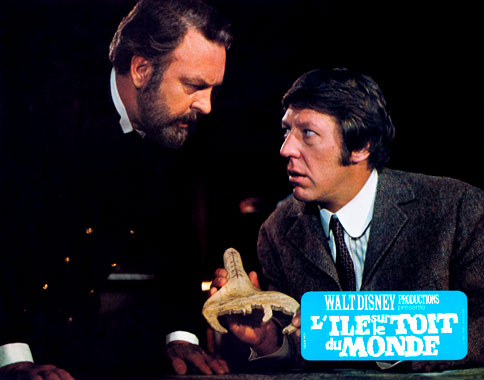
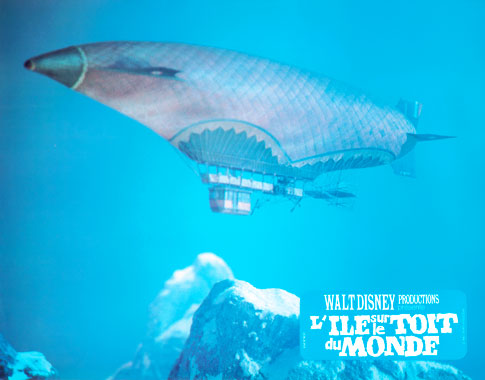
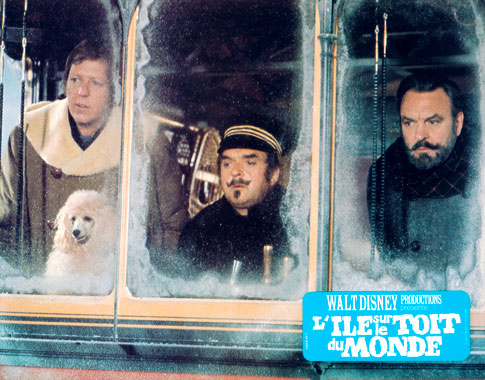

- Détails
- Écrit par David Sicé


La main enchantée (1974)
Diffusé en France le samedi 5 octobre 1974 à 20h30 sur ORTF 1 FR.
Sorti en DVD français le 4 septembre 2012 chez INA (copie non restaurée un peu floue, couleurs virées, image un peu bruitée, son mono correct, pas de bonus).
Rediffusé en France le 24 mai 2015 sur CinéFX en copie restaurée ?
De Michel Subiela (également scénariste), sur un scénario de Francis Lacassin, d'après la nouvelle de Gérard de Nerval ; Musique de Vladimir Cosma ; avec Pierre Maxence, Nathalie Juvet, Thierry Dufour, Didier Sauvegrain, Sarah Chandler, Serge Lhorca, Roland Monod, Alain Mottet, Robert Bordenave.
Pour adultes et adolescents
Le Vieux-Lyon à la Renaissance, sous le règne de François 1er. Une garde fait sa ronde de nuit. Celle-ci passée, un jeune homme déguisé en singe se faufile jusqu’à une porte, ouvrant la voie à un grand homme maigre au grand chapeau tout en noir, portant une chandelle piquée sur un chandelier torsadé. Comme il approche la chandelle de la porte, on entend le penne bouger avec hésitation, et la porte s’ouvre, toute seule. Le voleur et son acolyte montent à l’étage, suivent une galerie, ouvrent de la même manière une autre porte, et la suivante, jusqu’à la chambre d’un vieil homme endormi. Le voleur ouvre le coffre de la pièce voisine, toujours avec la chandelle, puis dépose la chandelle – en fait la main coupée qui tient le chandelier sur lequel est planté la chandelle, et lui et son acolyte commence à piller les richesses contenues dans le coffre. Mais le dormeur s’est réveillé et saisit d’un mousquet. Comme il va faire feu, la main coupée lui saute à la gorge, le jette à terre et l’étrangle.
Quelques temps auparavant, la victime de ce meurtre crapuleux, qui n’est autre que le juge et lieutenant de police Chevassut, ironisait sur la lecture du procès-verbal d’un vol, tout en se faisant faire une culotte par un chaussier-drapier. Voulant faire relire le passage sur l’ouverture en forme de trèfle que le voleur avait découpé dans le verre d’une fenêtre, le juge Chevassut s’emporte et laisse planté là le jeune chaussier-drapier : pour le juge, le voleur a eu de l’audace et a fait preuve de goût artistique, pour de pas déparer l’hôtel gothique qu’il cambriolait… Chevassut s’indigne que le valet du maître des lieux ait blessé le voleur, qu’il compare au poète François Villon.
Comme son secrétaire lui fait remarquer que selon le magistrat responsable de l’ordre dans la Cité, il aurait fallu pendre le bourgeois au lieu du voleur, ce que le secrétaire juge amoral. Le juge Chevassut persiste : le vol organisé sur une grande échelle favorise la division des fortunes et la circulation des richesses. Comme il reprend sa place auprès du tailleur et s’étonne que sa culotte ne tient pas, le tailleur s’excuse. Alors que Chevassut laisse entendre qu’il est volé et trompé quand le maître Goubart lui aura fait payé 8 deniers pour sa culotte. Le jeune chaussier-drapier s’indigne : selon lui, son maître n’escroquerait jamais son client. Le juge Chevassut salue alors l’indignation du jeune homme, qu’il juge feinte.
Le juge prétend alors que les marchands sont pires que les voleurs, car les voleurs ne mentent pas. Puis il prétend récompenser le jeune homme en l’honneur des prochaines noces de ce dernier, à la Saint Michel, d’un denier. Mais avant de le lui donner, Chevassut lui demande de bien regarder le denier, et le garçon met bien plusieurs secondes avant de réaliser que le denier a été rogné et a perdu un tiers de sa valeur. Il ordonne au jeune apprenti d’aller acheter un cadeau pour sa bien-aimée, Javotte, par exemple chez un marchand de parfum, Maître Guillomin, lequel de toute manière aura fraudé d’au moins un tiers sur le prix de ce que le jeune homme achètera. Mais Chevassut le met en garde : malheur au garçon s’il vole un pauvre avec ce denier.
Et le garçon, nommé Eustache, se rend chez Maître Guillomin, mais le jeune apprenti ne veut pas utiliser le denier, quand bien même Guillomin veut le prendre dans sa bourse. Prétendant que le denier ne lui appartient pas, Eustache n’achète que pour trois soles de parfum. Passant devant une estrade de comédien pour s’engager dans une ruelle encore animée, l’apprenti suit une femme en noir d’allure mystérieuse, qu’il prend pour une aveugle. Alors, Eustache tente d’échanger son écu contre de sa monnaie. La femme lui attrape la main qu’elle reconnait pour ne pas être celle d’un voleur. Elle traite alors le jeune homme de voleur de pauvre, et le remercie : selon elle la pièce est légère, mais le don est généreux.
Eustache pense avoir semé la femme, et s’attarde devant l’estrade d’un magicien, qui prétend pouvoir connaître le destin de n’importe qui en prenant sa main. Mais la femme surgit soudain derrière le jeune homme et lui saisit sa main droite, prétendant que la main d'Eustache est digne de toute l’attention du sorcier.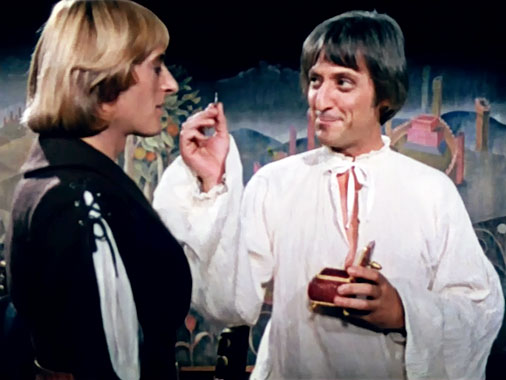
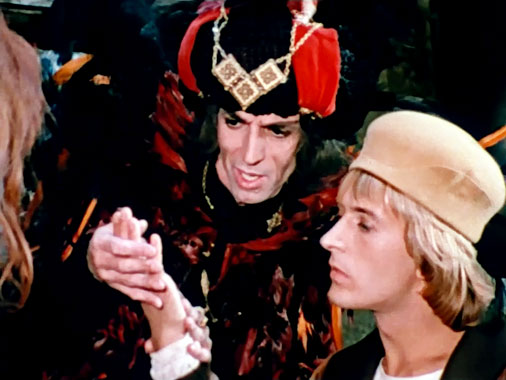
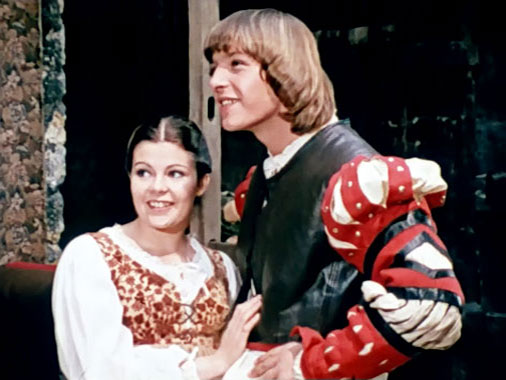
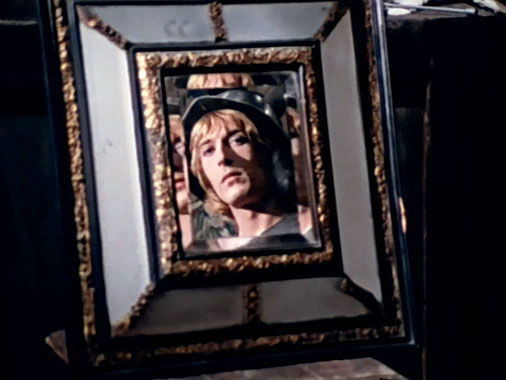
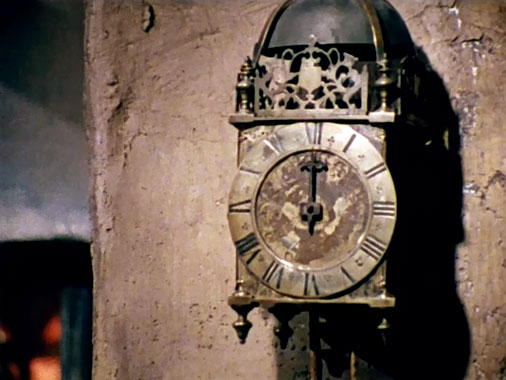
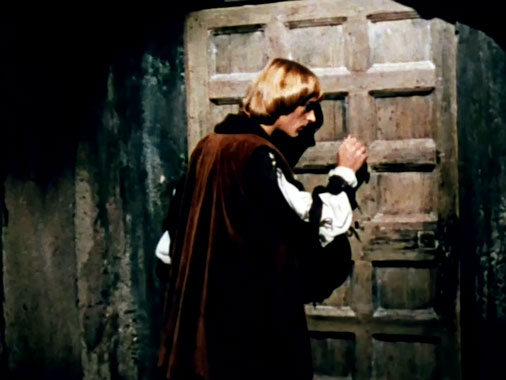
***
Donnez votre avis sur ce téléfilm en nous rejoignant sur le forum Philippe-Ebly.fr
***
- Détails
- Écrit par Greenheart
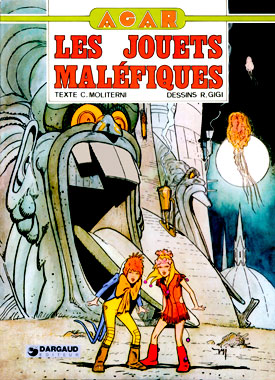

Agar 01: les jouets maléfiques
Sorti en France en octobre 1974 chez Dargaud.
Texte de C. Moliterni ; dessin de R. Gigi ; couleurs de E. Tran-Lè.
Quelque part dans l'univers, sur une planète féérique nommée Scorpia, un peuple d'artistes pacifiques voient apparaître des vaisseaux spatiaux aux ailes de papillons. Se réjouissant de recevoir une visite, le maître des lieux organise une fête en l'honneur des nouveaux venus. Les vaisseaux papillons se posent, et déversent une armée de robots souriants à oreilles de lapin - les Zombs - qui massacrent tout le monde. Le maître de la planète ne disposant d'aucun délai, parvient à mettre son fils Agar, habillé pour la fête, dans une fusée à destination de la planète Kompar - puis déclenche une apocalypse nucléaire pour anéantir la horde. La fusée du garçon atterrit sur Kompar, mais à peine hors du vaisseau, il retombe sur les robots zombs.
Agar parvient cependant à leur échapper dans le labyrinthe des dômes de la cité en ruines, et se camouflant à l'aide d'une ombrelle, il parvient jusqu'à la ville basse. Se croyant perdu, dos à un mur, Agar est sauvé par une jeune fille nommée Zarra, également en costume de fête. Alors qu'ils s'échappent par les égouts, Zarra confie à Agar son plan : venger leurs deux peuples. Agar pense que c'est de la folie, les robots Zombs sont maîtres de la Galaxie Sud, mais Zarra sait une chose qu'il ne sait pas : il n'y a qu'un seul homme à abattre, c'est leur maître Toïmaker, celui qui a créé les Zombs et qui compte remplacer tous les êtres vivants par des répliques en acier...
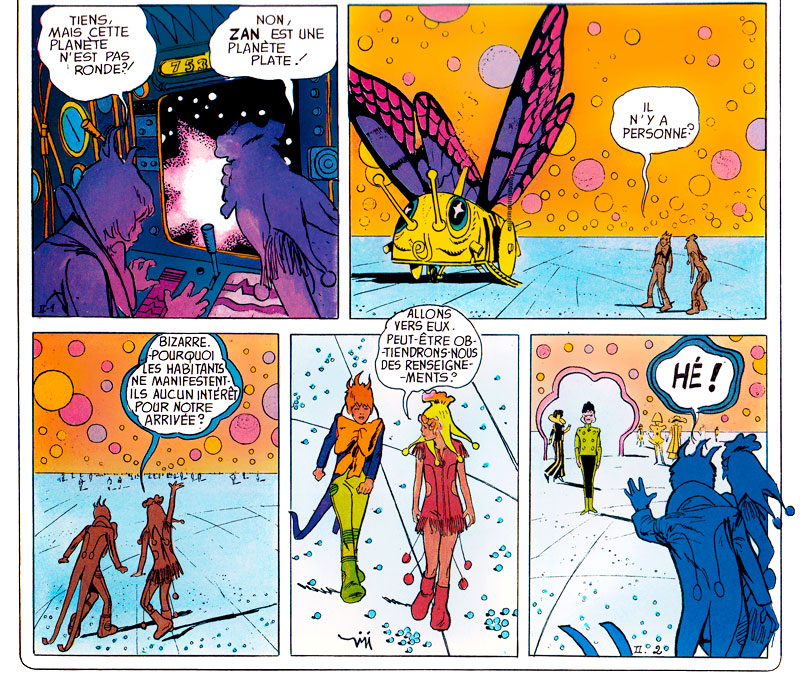
***
- Détails
- Écrit par David Sicé


Voici la liste des articles de ce blog consacrés aux films de Science-fiction, Fantasy, Fantastique et Aventure annoncé pour l'année 1973. Cette liste sera mise à jour au fur et à mesure de la rédaction des articles.
Ici le calendrier cinéma pour 1974.
Ici le calendrier cinéma pour 1972.
***


Décembre 1973
En France
La planète sauvage (d'après le roman Oms en série, 6 décembre, The Fantastic Planet)
Aux USA
La planète sauvage (d'après le roman Oms en série, 1er décembre, The Fantastic Planet)
L'exorciste 1973 (horreur, démon, The Exorcist, 26 décembre 1973)
En Angleterre
The Wicker Man 1973 (horreur, 6 décembre 1973)
Le voyage fantastique de Sinbad (20 décembre 1973, The Golden Voyage of Sinbad)
***


Novembre 1973
En France
Aux USA
Mondwest (21 novembre, Westworld)
En Angleterre
En Allemagne de l'Ouest
De la chair pour Frankenstein 1973 (pour adultes, horreur, Flesh For Frankenstein, 30 novembre 1973)
***

Octobre 1973
En France
Aux USA
En Angleterre
Les décimales du futur 1973 (d'après le roman, The Final Programme, 4 octobre 1973)
***
Septembre 1973
En France
Aux USA
En Angleterre
Le métro de la Mort (1972, Death Line, Raw Meat)
***

Août 1973
En France
La Bataille de la planète des singes 1973 (Battle For The Planet Of The Apes, 8 août 1973)
Aux USA
En Angleterre
***

Juillet 1973
En France :
Aux USA :
En Angleterre
La Bataille de la planète des singes 1973 (Battle For The Planet Of The Apes, 8 août 1973)
Au Japon :
***
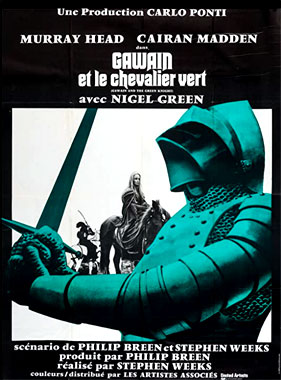
Juin 1973
En France
Aux USA
La Bataille de la planète des singes 1973 (Battle For The Planet Of The Apes, 8 août 1973)
En Angleterre
Gawain et le Chevalier Vert 1973 (Fantasy arthurienne, juin 1973)
Au Japon
***
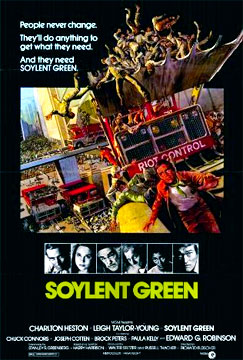
Mai 1973
En France
Aux USA
Soleil Vert (9 mai, Soylent Green)
En Angleterre
***
Avril 1973
En France
Aux USA
Au Japon
***
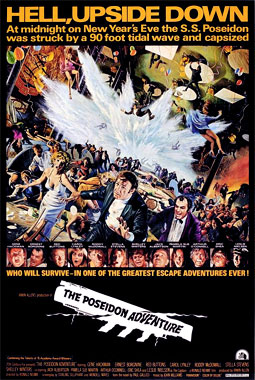
Annoncés pour mars 1973
En France :
L'aventure du Poseïdon 1972 (29 mars, The Poseidon Adventure)
Aux USA :
En Angleterre :
L'aventure du Poseïdon 1972 (2 mars, The Poseidon Adventure)
***
Annoncés pour février 1973
En France
Aux USA
En Angleterre
En Allemagne
***

Annoncés pour janvier 1973
En France
Traitement de choc (18 janvier, Shock! // Shock Treatment)
Aux USA
***
